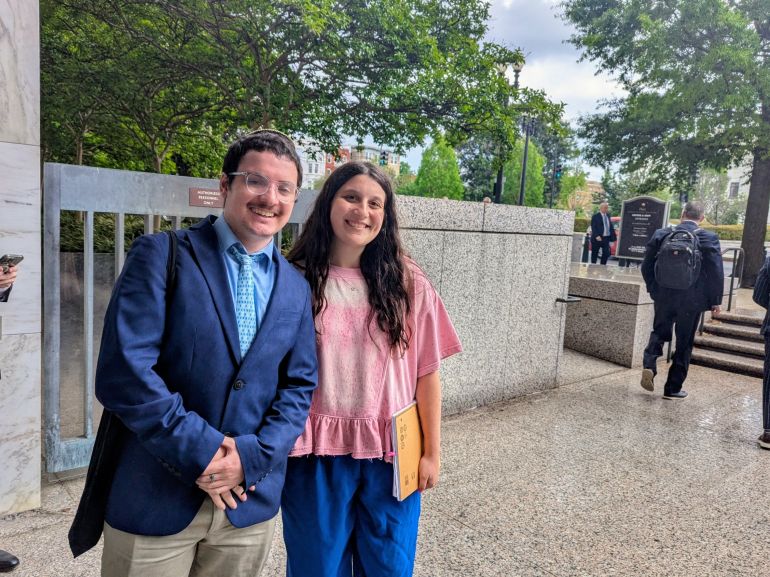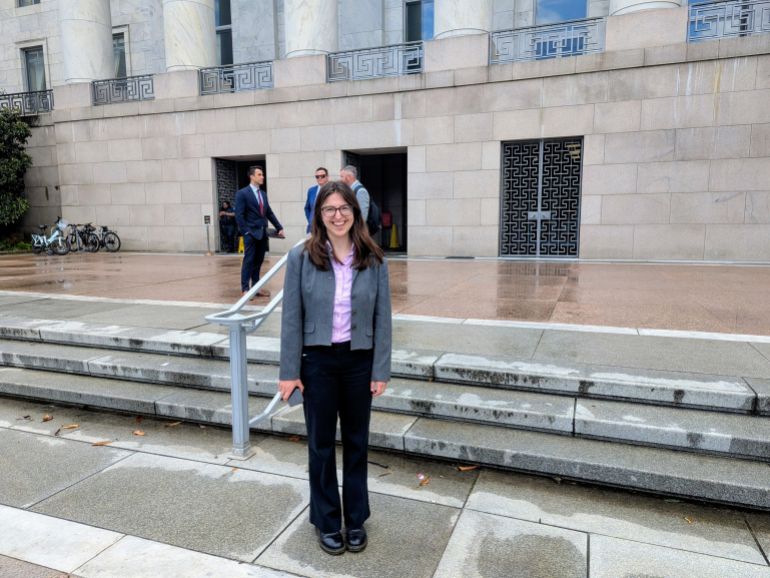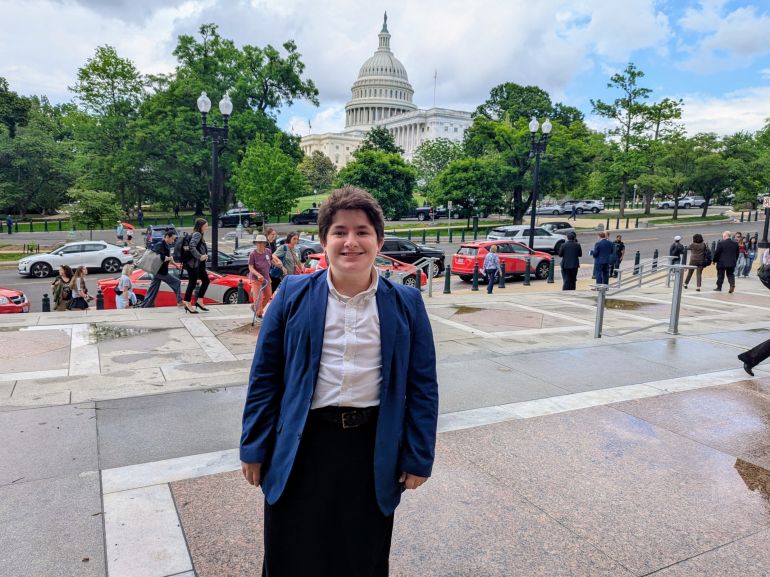Washington, DC – Jewish students involved in protests at Columbia University say their pro-Palestinian activism is driven by their faith – not in spite of it.
On Tuesday, a group of Jewish student activists met with members of the United States Congress in Washington, DC, to tell their stories, which they say have been left out of mainstream narratives about anti-Semitism on college campuses.
As student protests against Israel’s war in Gaza swept the country last year, Columbia University in New York became a flashpoint.
The university saw one of the first student encampments in the country, erected to demand an end to investments in companies complicit in human rights abuses. Shortly after the tents started popping up, the campus also witnessed some of the first mass arrests of student protesters in the Palestinian solidarity movement.
That visibility has made Columbia a focal point for President Donald Trump’s efforts to crack down on what he called “illegal protests” and campus anti-Semitism.
Earlier this year, Columbia student Mahmoud Khalil became the first student activist to be detained by the Trump administration and targeted for deportation.
Tuesday’s delegation of Jewish students came to Congress to push the case that Khalil and others like him should never have been detained in their name. They met with at least 17 Democratic legislators from both the House of Representatives and the Senate.
Al Jazeera spoke to several students who participated in the lobbying day, which was organised by Jewish Voice for Peace (JVP) Action, an advocacy organisation. Here are some of their stories:
Tali Beckwith-Cohen
Raised in upstate New York, history major Tali Beckwith-Cohen said she grew up in a community where Zionism was the norm. She remembers being told “myths” about Palestine as “a land without a people for a people without a land”: a slogan used to justify the establishment of Israel.
But as she began to learn Palestinian history and meet Palestinians, Beckwith-Cohen said her beliefs were challenged.
Eventually, after the war in Gaza began in October 2023, she became involved in Palestinian rights activism.
Human rights groups and United Nations experts have found evidence that Israel’s tactics in Gaza are “consistent with genocide”. More than 52,615 Palestinians have been killed in the conflict so far.
“For a long time, I had this kind of feeling of discomfort, this feeling of wrestling, this feeling of maybe cognitive dissonance, and how can I reckon these values I hold dear with Zionism?” Beckwith-Cohen told Al Jazeera.
“We are seeing the bombing, the disregard for human life, for children, for hospitals, for schools. It forced me to make a choice.”
She stressed that the protests were spaces of solidarity, where students of all backgrounds were committed to the idea that their safety is intertwined.
“There’s so much in the media narrative about what’s happening on Columbia campus that is just disingenuous and just so untrue to what we’ve experienced,” Beckwith-Cohen said.
“So we’re here today to tell our Congress people that what we’re seeing on campus is clearly an authoritarian, fascist crackdown on all dissent, not only students peacefully advocating for an end to genocide.”

Carly Shaffer
When Carly Shaffer voiced concern about the Israeli escalation in Gaza on a university WhatsApp chat, some of her fellow students questioned her Judaism.
Out of the hundreds of people on the chat, she remembers that Khalil – the activist arrested for deportation – was the only person who contacted her directly to reject the comments she was subjected to.
As she got to know Khalil, she came to view him as the “embodiment” of someone who cared about the safety of all students on campus.
Shaffer told Al Jazeera that she felt “sick” and “horrified” when Khalil was arrested. Her discomfort was then compounded when she saw that the Trump White House celebrated his detention on social media with the phrase “Shalom, Mahmoud” – a Jewish greeting repurposed as a taunt.
Shaffer, who is pursuing a master’s degree in human rights and social policy, grew up in California and was raised by a single mother in a low-income household.
She said speaking out against injustice – including in Palestine – is a practice rooted in her Jewish faith.
“The Columbia protest movement, it’s a movement of love. It’s a movement of solidarity,” Shaffer said. “And Jewish students are also integral and crucial to this movement.”
She said that, when Jewish student protesters held religious events on campus, their peers from the encampment joined them and inquired about their traditions.
“These are the same students who are being portrayed as anti-Semites, who are going out of their way to go and learn about Passover and celebrate a Jewish holiday with their Jewish friends,” Shaffer told Al Jazeera.
She decried the “weaponisation of anti-Semitism”, saying that the issue is being used to shut down conversations about Israeli atrocities in Gaza.
“Jewish students are being used as pawns in Trump’s political agenda,” she said. “And the weaponisation of anti-Semitism to dismantle this movement is not just a threat to Jewish students; it’s a threat to all of us. That’s why it is so important for us as Jewish students to directly correct this false narrative.”

Sarah Borus
Barnard College student Sarah Borus, who was arrested during the crackdown on the Columbia encampment, said she grew up in an anti-Zionist family in a “very Zionist community”.
She felt it was important for Jewish students like herself to convey their experiences directly to the people in power in Washington, DC.
“We’re talking to members of Congress to tell them our stories that are left out of mainstream news,” Borus told Al Jazeera.
“Trump’s mission is not about protecting Jewish students. It is about using fears of anti-Semitism – because of the way that the Gaza solidarity encampment was portrayed last year – in order to target non-citizen student activists, in order to target academic freedom, free speech, and really put many, many people in danger.”
When asked how she feels about the potential backlash to her activism, Borus acknowledged that the current political climate left her fearful.
“I’m scared, but in the grand scheme of things, I’m proud of the choices I have made,” she said. “I would not make any different ones, and I am willing to take on the risks, if that’s what must be done.”

Shay Orentlicher
Shay Orentlicher has no regrets about participating in Columbia University’s encampments, despite the administrative and political crackdowns.
Orentlicher said Christian nationalists are trying to erase the perspective of pro-Palestine Jewish students and define Judaism in a way that fits their political purposes.
But protesting against the killing of Palestinians, Orentlicher said, is an expression of both Jewish and humanist values. And Orentlicher believes that Columbia’s demonstrations have helped raise awareness nationwide.
“Despite the oppression we have faced, despite the suffering, and despite the despair of worrying that we have not done enough to stop the genocide, to stand up for Palestinians in Gaza and the West Bank, I think we have shifted the public discourse in a really important way,” Orentlicher said.
“And we also have built a really beautiful community. And I don’t regret what I did at all. I wouldn’t change anything.”
Raphie
Raphie, who chose to identify by his first name only, said he grew up “very Zionist”. But as he learned more about the conflict between Israelis and Palestinians, he felt he had been deceived.
“The Jewish elementary school I went to, for instance, had a map of Israel, and it was like a diamond – no West Bank or Gaza on it,” he said.
“When I saw the actual map with the occupied territories, I was like, ‘Wait, I was lied to.’ And that kind of made me go on this whole journey of exploring what Zionism is, what occupation is, what settler colonialism is.”
Raphie, who is studying maths, said the war on Gaza, the campus protests and the backlash the student protesters faced all made him feel a “personal responsibility to fight for what is right”.
In his experience, the demonstrations were welcoming, not anti-Semitic. What was anti-Semitic, he said, was the fact that the university targeted Jewish student protesters for their political views.
Several students, including Raphie, said Columbia refused to grant students associated with Jewish Voice for Peace the permission necessary to hold religious celebrations in public spaces. They described that rejection as a form of discrimination.
The university did not respond to Al Jazeera’s request for comment by the time of publication.
Raphie also drew a distinction between feeling uncomfortable about ideas that challenge one’s worldview and actually being unsafe.
“It’s normal in college to encounter new viewpoints, new perspectives. That’s how I became more pro-Palestinian and anti-Zionist,” he said. “I initially felt uncomfortable when I encountered anti-Zionist views, but then I grew to understand them. That’s normal.”
Raphie stressed that the real suffering is happening in Gaza.
“The students who are not safe right now, of course, are the students in Gaza. Every university in Gaza has been destroyed. They haven’t had food for 60 days.”